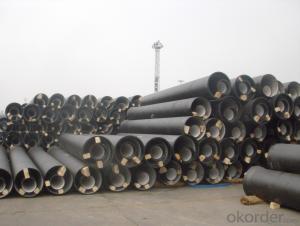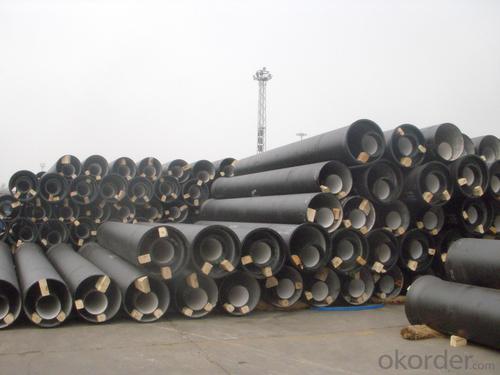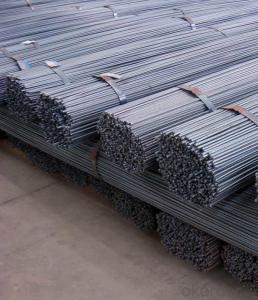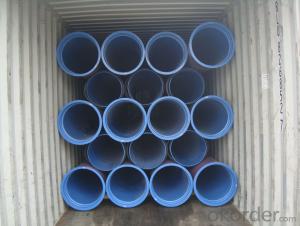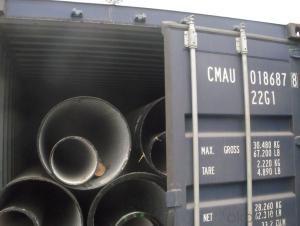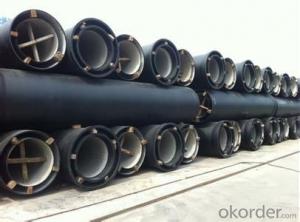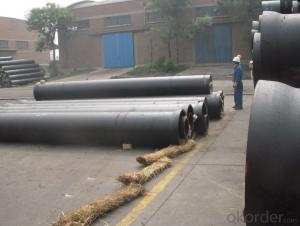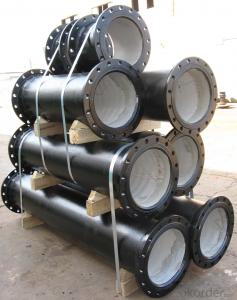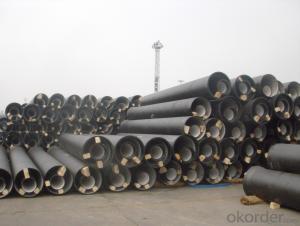DUCTILE IRON PIPES AND PIPE FITTINGS K8 CLASS DN700
- Loading Port:
- Tianjin
- Payment Terms:
- TT OR LC
- Min Order Qty:
- 22 pc
- Supply Capability:
- 3000 pc/month
OKorder Service Pledge
OKorder Financial Service
You Might Also Like
Material : Ductile Cast Iron
Size Range : DN 80mm to DN 2000mm
Unit Effective Length : 6m or 5.7m
Manufacture Standard: ISO 2531:1998/ EN 545:2006/EN 598:2007
Annual capacity : 200,000 tons
Coating Exterior: Zinc 130g/m2 according to ISO 8179-1 and bitumen coating 70 microns.
Cement Interior: Portland Cement/ High Alumina Cement/ Sulphate Resisting Cement Lining according to ISO 4179
Special requirements on external coating and internal lining can be applied
We also provide accessories such as SBR/EPDM rubber gaskets, lubricant paste, pipe caps, PE sleeves, etc.
Additional Parts:
Each pipe is strictly inspected according to related standard to ensure permanently high performance.
Easy Installation at site and service free for life
Long Service Lifespan
Quotation will arrive you within 24hours once we get your inquiry.
We guarantee offering you a competitive price.
A copy of original inspection reports of pipes will be offered after shipment.
Photos of loading process will be sent to the customer after shipment effect.
We will follow-up the delivery progress after shipment effect and update to the customer on weekly basis.
- Q: Are ductile iron pipes suitable for use in chemical storage tanks?
- Ductile iron pipes are not suitable for use in chemical storage tanks. While ductile iron pipes have excellent mechanical properties, including high tensile strength and impact resistance, they are not resistant to corrosion caused by various chemicals. Chemical storage tanks require materials that can withstand the corrosive properties of the stored chemicals to ensure the safety and integrity of the tank. Therefore, materials such as fiberglass-reinforced plastic (FRP), stainless steel, or high-density polyethylene (HDPE) are commonly used for chemical storage tanks due to their superior corrosion resistance. It is crucial to select the appropriate material for chemical storage tanks to prevent leaks, contamination, and potential hazards.
- Q: How does ductile iron pipe perform in seismic conditions?
- Seismic conditions are where ductile iron pipe truly shines. This type of pipe has gained a reputation for its outstanding performance in such situations, making it the go-to choice for underground water and wastewater systems, particularly in earthquake-prone areas. The remarkable strength and flexibility of ductile iron pipe make it highly resistant to seismic forces. It can withstand the ground movements and vibrations caused by earthquakes without suffering significant damage or failure. The secret lies in its unique composition, which consists of a high iron content combined with small amounts of carbon and other alloying elements. The crucial advantage of ductile iron pipe in seismic conditions is its ability to absorb and dissipate seismic energy through its inherent flexibility. When the ground shifts during an earthquake, the pipe can adapt and deform slightly to accommodate the movement. This minimizes stress concentrations and reduces the risk of fractures. Furthermore, the joint integrity of ductile iron pipe is exceptional, a vital characteristic in seismic conditions. The joints are designed to offer maximum strength and resistance against external forces, including seismic activity. Different joint types, such as push-on, mechanical, and restrained joints, are available to suit various seismic requirements and installation conditions. Not only does ductile iron pipe possess impressive mechanical properties, but it also offers long-term corrosion resistance. Typically, the pipe is lined with a cement mortar or a protective coating, acting as a barrier against corrosive elements present in the soil or water. This corrosion resistance ensures the pipe's structural integrity and longevity, even in regions with high seismic activity. Overall, ductile iron pipe has a proven track record of exceptional performance in seismic conditions. Its strength, flexibility, joint integrity, and corrosion resistance make it a reliable choice for underground infrastructure, providing secure and efficient water and wastewater systems in areas prone to earthquakes.
- Q: Can ductile iron pipes be repaired if they are damaged?
- Yes, ductile iron pipes can be repaired if they are damaged. Various repair methods, such as spot repair or full line replacement, can be employed depending on the extent and nature of the damage. Experienced technicians can assess the damage and determine the most suitable repair technique to restore the functionality and integrity of the ductile iron pipes.
- Q: How can the ductile iron pipe elbow be fixed?
- Ductile cast iron pipe in the groove pipe connection technology is also called the lathedog connection technology, has become the most liquid and gas pipeline connection technology, although this technology is later than foreign in domestic development time, but because of its advanced technology, domestic market quickly received. Since 1998, it has been developed and applied in just a few years. It has gradually replaced two traditional ways of pipe connection, such as flange and welding. Not only technically more mature, the market is generally recognized, but also by the national laws and regulations actively guide the policy. The application of grooved pipe connection technology makes the complex pipe connection procedure simple, fast and convenient. Took a big step forward in pipeline connection technology.
- Q: What are the common causes of failure in ductile iron pipes?
- Ductile iron pipes can fail for various reasons. Corrosion is a significant factor. When exposed to water, soil, and other environmental elements, rust and corrosion can develop on the pipe's surface. This weakens the pipe's structure and eventually causes failure. Improper installation or mishandling is another common cause. If the pipes are not correctly installed or if they sustain damage during transportation or installation, they may develop cracks, fractures, or other physical defects. These issues compromise the pipe's functionality and contribute to failure. Inadequate design can also lead to failure. When a pipe is not designed to withstand expected loads, pressures, or environmental conditions, it becomes vulnerable to premature failure. It is crucial to carefully consider material properties, wall thickness, and diameter during the design process to ensure the pipe can handle the demands placed upon it. Failure can also result from poor maintenance and delayed repairs. Regular inspections, maintenance, and timely repairs are essential for identifying and addressing issues before they worsen. Neglecting these measures can lead to the gradual deterioration of the pipe, increasing the likelihood of failure. Lastly, external factors such as soil movement, seismic activity, or excessive traffic loads can cause failure in ductile iron pipes. These forces exert stress on the pipe, resulting in cracks, fractures, or complete failure. To prevent failure in ductile iron pipes, it is crucial to employ proper corrosion protection techniques, adhere to correct installation procedures, consider design factors adequately, implement regular maintenance and repair programs, and account for external factors during the planning and installation process.
- Q: If the ductile iron pipe is broken, can we use rush repair?
- PE pipe repair section, as the name suggests, is a kind of used to repair the pipeline accessories. At present, the specifications of the repair section are: Phi 90, Phi 110, Phi 125, Phi 160, Phi 200, Phi 225, Phi 250, Phi 315 these specifications.
- Q: How do ductile iron pipes perform in high-velocity water flow conditions?
- Ductile iron pipes perform exceptionally well in high-velocity water flow conditions. Due to their unique composition and manufacturing process, ductile iron pipes exhibit superior strength and durability, making them highly resistant to the forces generated by high-velocity water flow. These pipes are specifically designed to withstand significant hydraulic pressure and turbulent conditions. Their inherent ductility allows them to absorb the energy of the flowing water and effectively dissipate any potential stress or impact that may occur. Additionally, the smooth internal surface of ductile iron pipes minimizes frictional losses, enabling efficient water flow even at high velocities. This characteristic is crucial in maintaining the required water pressure and flow rates in applications such as water distribution systems, sewage networks, and industrial processes. Moreover, the corrosion resistance of ductile iron pipes further enhances their performance in high-velocity water flow conditions. These pipes are typically lined with cement mortar or polyethylene, which provides an additional layer of protection against the corrosive effects of fast-flowing water. Overall, ductile iron pipes are well-suited for high-velocity water flow conditions, offering exceptional strength, durability, and hydraulic efficiency. Their ability to withstand the challenges posed by fast-flowing water makes them a reliable choice for a wide range of applications where high water velocity is a concern.
- Q: How is ductile iron pipe different from other types of pipes?
- Ductile iron pipe is different from other types of pipes in several ways. Firstly, ductile iron pipe is known for its exceptional strength and durability. It is made from a unique composition of iron, carbon, and other alloying elements, which gives it superior mechanical properties compared to other types of pipes. This makes ductile iron pipe highly resistant to external forces and pressure, making it ideal for underground installations, water mains, and sewer systems. Secondly, ductile iron pipe has excellent corrosion resistance. It is typically lined with a cement mortar or an internal coating, which provides a protective barrier against corrosion and extends the pipe's lifespan. This makes ductile iron pipe highly suitable for carrying water and other fluids, as it prevents contamination and maintains the quality of the transported material. Furthermore, ductile iron pipe offers a high degree of flexibility. Unlike more rigid pipe materials like cast iron, ductile iron pipe has the ability to withstand moderate deflection and ground movement without breaking or cracking. This flexibility makes it less prone to failure and reduces the need for costly repairs or replacements. Lastly, ductile iron pipe is relatively easy to install and maintain. It is typically available in long lengths, which minimizes the number of joints required. Additionally, the pipe's mechanical properties and corrosion resistance make it less susceptible to damage during installation or operation, resulting in lower maintenance costs over time. In conclusion, ductile iron pipe stands out from other types of pipes due to its exceptional strength, corrosion resistance, flexibility, and ease of installation. These qualities make it a reliable and cost-effective choice for various applications, especially in the water and wastewater industry.
- Q: Are ductile iron pipes suitable for use in oil refineries?
- Yes, ductile iron pipes are suitable for use in oil refineries. Ductile iron is a type of cast iron that offers a unique combination of strength, durability, and flexibility, making it an excellent choice for various applications, including oil refineries. One of the key advantages of ductile iron pipes is their high tensile strength, allowing them to withstand the high pressure and stress commonly found in oil refining processes. This strength is crucial for the transportation of various fluids, including crude oil, refined petroleum products, and chemicals within the refinery. Additionally, ductile iron pipes have excellent corrosion resistance properties, making them highly resistant to the corrosive effects of oil, chemicals, and other substances typically present in oil refineries. This corrosion resistance ensures the longevity and reliability of the pipes, reducing the need for frequent maintenance and replacement. Furthermore, ductile iron pipes have exceptional ductility, which means they can absorb and withstand significant impacts and vibrations without fracturing or breaking. This quality is advantageous in oil refineries where there may be frequent movement or potential stressors due to machinery, equipment, or ground settlement. Moreover, ductile iron pipes have a smooth interior surface that reduces friction, allowing for efficient fluid flow and minimizing pressure loss. This characteristic is essential in oil refineries, as it helps optimize the transportation of fluids, ensuring a smooth and reliable production process. In conclusion, ductile iron pipes are suitable for use in oil refineries due to their high tensile strength, corrosion resistance, ductility, and smooth interior surface. These pipes provide a reliable and durable solution for transporting various fluids within the refinery, contributing to the efficient and safe operation of oil refining processes.
- Q: Can ductile iron pipes be used for gas distribution networks?
- Yes, ductile iron pipes can be used for gas distribution networks.
Send your message to us
DUCTILE IRON PIPES AND PIPE FITTINGS K8 CLASS DN700
- Loading Port:
- Tianjin
- Payment Terms:
- TT OR LC
- Min Order Qty:
- 22 pc
- Supply Capability:
- 3000 pc/month
OKorder Service Pledge
OKorder Financial Service
Similar products
Hot products
Hot Searches
Related keywords
